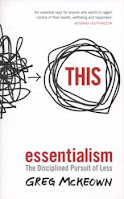Here we go with the fourth and final portion of our discussion of how we writers can apply Essentialism: The Disciplined Pursuit of Less by Greg McKeown to our lives. Today we’re talking about one of my favorite time management techniques, what I call set aside times. (Sometimes I've hyphenated it, sometimes I haven't. I accept that.) I'm talking a chunk of time--a weekend, a week, a month, or even more-- that we have set aside to do one thing. You can think of it as binging. Binge writing, binge editing, binge submitting.Binging whatever you think is essential.
Life is chaos, as I've mentioned here a number of times over the last couple of years. Planning to work in blocks of time that we've committed to specific things helps to control that chaos, at least for a little while. To quote myself, "Looking forward to our future, which we, of course, expect to go on forever, it's hard to get a handle on controlling things, because will power and self-discipline are finite." With shorter periods of time, it is possible to get some control. Additionally, if we try to manage our time around what is essential to us, that's not going to work long-term, either, because, as I said in an earlier post in this arc, that keeps changing. So we can't rely on just defining what is essential to us to help contain chaos for a lifetime.
But we should be able to use it to contain the chaos for a weekend, a week, or a month. Maybe even a semester, if we've decided a class is essential right now.
Planning
In his book, McKeown speaks briefly about extreme preparation. Preparation is going to be a big help in working with set-aside times. In the lead up to any kind of set-aside time, we'll want to plan:
- To get other small work jobs out of the way before we start so they won't divert us from the essential task
- To get as much pre-writing work done as possible
- To decide what pre-writing work we want to do, if that's what the set-aside time is for
- To coordinate the set-aside time with our day jobs so that we aren't trying to work intently on something essential to our writing at the same time we know we'll have extra work for the day job
- To get as much personal life work out of the way or under control, meaning we don't plan trips or guests during the set-aside time, and to try to find a way to bring family obligations down to a minimum for that period.
A Perfect Example
A perfect example of applying essentialism to writers lives in a set-aside time is National Novel Writers' Month. That has helped many writers jump starting new projects or completing first drafts. They had one essential thing they were doing for one month--writing 50,000 words.


No comments:
Post a Comment